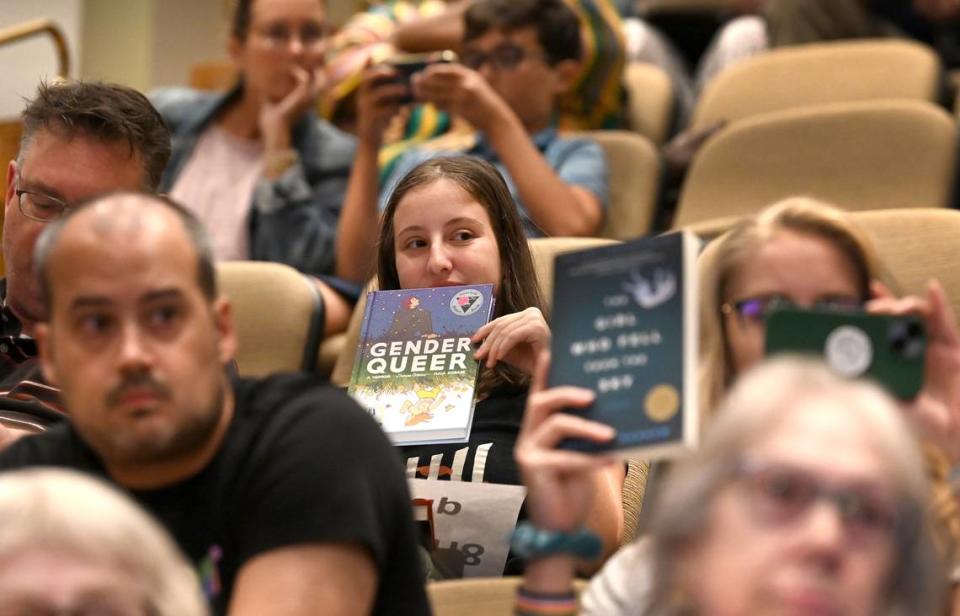NC school district bans a book about crayons. Are you happy, Republicans? | Opinion
Charlotte-Mecklenburg Schools appears to be banning books about crayons now.
Yes, really.
Following parent complaints, the district has apparently decided that “Red: A Crayon’s Story” may not comply with North Carolina’s new parental rights law, which bans instruction on gender identity, sexual activity and sexuality in kindergarten through fourth-grade classrooms.
I took the liberty of reading “Red: A Crayon’s Story,” just to see what the fuss might be about. It’s a picture book about a crayon that is told he is red, but can’t do things that red crayons can do, like draw red strawberries, red hearts or red ants. Instead, everything he draws is blue. His fellow crayons suggest that if he works a little harder, or fixes whatever is wrong with him, he can do the things that red crayons are supposed to do. In the end, he realizes that he’s actually just blue, and that’s perfectly OK.
Real controversial, huh?
While the book could be used as an allegory for gender identity or sexuality, it doesn’t have to be. It could represent just about anything that has to do with stereotypes or labels forced upon us by society. It’s not promoting any agenda, other than the basic message that we should be true to ourselves and embrace our differences, instead of judging one another for them.
In fact, that’s exactly what it was meant to teach in the classroom. CMS told me that the book was selected to teach kindergarten students about differences and acceptance, as part of the district’s agreement to provide age-appropriate Title IX lessons to all students about harassment and bullying.
“We received concerns from parents and guardians about the book as it relates to the Parents Bill of Rights, specifically, age-appropriate instruction for grades kindergarten through fourth grade,” the district said in a statement. “Upon further review the book was removed.”
What’s interesting is that, about six years ago, “Red: A Crayon’s Story” was viewed as a palatable alternative to “Jacob’s New Dress,” a picture book about a boy who likes to wear dresses. “Jacob’s New Dress” was meant to be used as part of an anti-bullying program in first-grade classes. But Republican lawmakers caught wind of that plan and were prepared to step in, until CMS decided to replace it with “Red: A Crayon’s Story” instead. That seemed to be a good enough solution at the time.
But flash-forward to 2023, and reading books like “Red: A Crayon’s Story” to elementary school students may actually be illegal in North Carolina. The Parents’ Bill of Rights is apparently vague enough to cause CMS to steer clear of a book about crayons, despite the fact that it makes zero reference to gender identity or sexuality. I repeatedly asked whether “Red: A Crayon’s Story” would still be available to students in school libraries, but CMS did not respond.
It’s a sign that our society may be regressing. Old tropes and tactics — like calling queer folks “pedophiles,” or book-banning — are being dusted off and recycled. Questions we thought were close to being resolved are being re-litigated. Requests to ban books at U.S. schools and libraries hit a 21-year high in 2022, and a record number of anti-LGBTQ bills have been introduced in state legislatures this year.
We can see this regression by comparing North Carolina’s present with its recent past. In 2016, House Bill 2 was such an extreme outlier that the nationwide backlash it received ultimately forced its repeal. In 2023, we’re passing laws like HB2 on a regular basis, and there’s minimal political and economic fallout for Republicans.
The Charlotte Observer published an editorial about the “Jacob’s New Dress” saga back in 2017, applauding CMS for choosing “Red: A Crayon’s Story” as a substitute instead of scrapping its lesson plans altogether.
“By no means are gays and lesbians safe from bias and violence now, but progress has come slowly and inevitably, as it does for minority groups,” the editorial said then. “The same will happen, in small steps, with the transgender community.”
That seemed like a reasonable prediction at the time. But thanks to an insurgence of reactionary conservatives, we’ve ended up in a much different place — one in which we reflexively ban anything that could possibly imply acceptance of the LGBTQ+ community, for fear that 5-year-olds might pick up on the metaphor.


